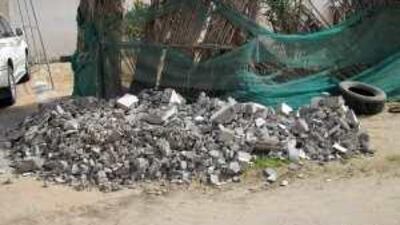ABU DHABI // Authorities are drafting procedures to quell the rampant illegal dumping of construction waste across the emirate, with lorry drivers facing fines of up to Dh10,000 (US$2,720) and the impoundment of their vehicles.
Under the proposals, lorry drivers will have to register with the Government, and their activities will be more closely monitored to prevent the illegal unloading of concrete, aggregate and other materials discarded from the capital's building boom. Some drivers have acknowledged that, rather than making a two-hour trip to the landfill at Al Dhafra, they often dispose of their loads at local dump sites. Piles of building debris have become so common at the sides of roads and in the desert, especially in Al Gharbia, that the authorities now feel compelled to take firm action.
"We want to make penalties very harsh so nobody does it," said Nabil Mudalal, a senior engineer with the Centre for Waste Management - Abu Dhabi. Waste from construction accounts for between 60 and 70 per cent of all Abu Dhabi's refuse, Mr Mudalal said. The illegal dumping is not restricted to stone, cardboard and steel. The centre has even caught drivers dumping sewage in the desert, he said, forcing the centre to spend up to Dh12 million each year to clean things up.
"No company is responsible for lorry drivers," Mr Mudalal said. "So if you go to Mussafah, you can go and hire one and he will charge you less, maybe Dh200 or Dh300, is what I'm told. Then, instead of going all the way to Al Dhafra, they will dump it anywhere, here and there." Under the new procedures, lorry drivers will be required to register their vehicles with the waste management centre. Lorries will then be given stickers to prove they are entitled to ship waste materials between construction sites and landfills. The agency will open offices in Mussafah, Al Ain and Al Gharbia. Operators of construction sites, lorry companies and landfills will be required to monitor the waste disposal process from beginning to end.
Penalties for drivers who illegally accept waste will be severe, Mr Mudalal said. Although the fines still must be approved by the Executive Council, he expected they would range between Dh5,000 and Dh10,000. Offenders would also have their vehicles impounded for up to a month. The new system, in which inspectors from the centre will enforce the regulations in co-operation with the police, should be in place within two months, he said.
The agency is also building two new recycling facilities, in Abu Dhabi and Al Ain, which will manage waste that can be reused on construction projects. One of those plants is scheduled to open in April, the other by the end of next year. "Abu Dhabi is fast developing, and we have a lot of projects," he said. "Of course, some of the projects are a little slow right now because of the global downturn, but we expect maybe within the next month they will continue growing. So we have to find a solution to divert this waste out of landfill. We want to change ideas about waste, it's a resource if we recycle it."
The centre took over waste management duties from Abu Dhabi Municipality in February. In Dubai, the duties are still handled by the municipality. There, more than 500 volunteers were recently enlisted to watch for unsightly piles of trash and litter. Rewards have been given to members of the public for reporting lorry drivers who dump sewage into the sea and storm drains, a practice that resulted in the brief closure of several public beaches and a sailing club because of increased E.coli levels.
In Abu Dhabi, empty construction lots often become dumping grounds. On the site of a former school in the Al Manaseer neighbourhood, a dirt lot surrounded by blue and silver waste bins is often filled to the brim with wood, cardboard, stone and even furniture, according to local residents. "It's coming from all of the apartments around here," said Abdul Kader, who has lived in the capital since 1989. "It's wood things, and sometimes you find furniture and sofa beds. This is what I've seen."
He said the area, which is littered with broken brick, discarded car parts, road signs, glass and tree and bush cuttings, was frequently used by children. "Last time I came out I found a washing machine under my building," he said. Abdul Aziz, 26, who was playing football on the street next to the site, said small heaps of stone, wood and waste were frequent sights at the spot, although they were cleared quickly. "Usually they are gone within a day," he said.
Illegal dumping is also a problem on Saadiayat Island, site of the future Louvre and Guggenheim museums. The massive construction projects have led to thousands of tons of unusable stone, dried concrete, steel, plastic and cardboard. To prevent illegal dumping, the Tourism Development and Investment Company established a waste management facility on the island in April. Rather than transporting waste for two hours to the nearest landfill, drivers can take it to the facility on Saadiyat, where it can be sorted and processed for possible reuse on construction sites.
The project has already recovered almost 200,000 cubic metres of material from 215,000 cubic metres of waste that would have otherwise been discarded. jgerson@thenational.ae

